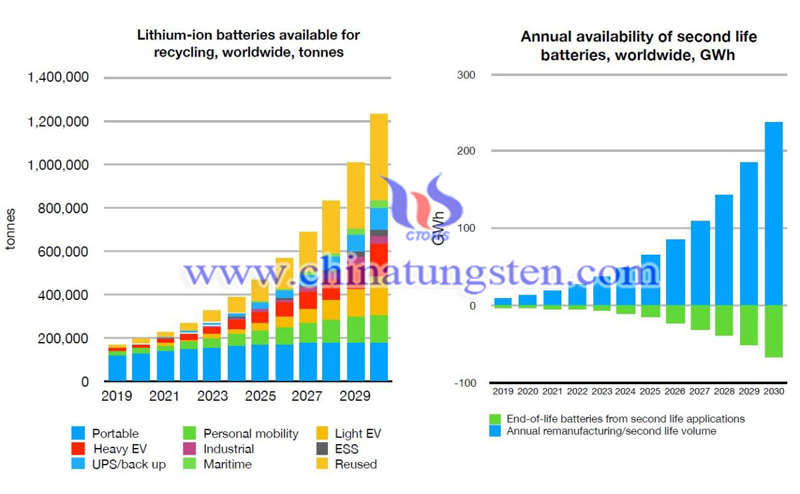Lithium Batteries Recycling Will Reach 1.2Millon Tons by 2030
- Details
- Category: Tungsten's News
- Published on Monday, 11 November 2019 14:16
Lithium batteries will be scrapped by 1.2milllion tons between last year and 2030, driven by EV battery usage and portable electronics, according to data released by London-based storage recycling research group Circular Energy Storage.
Analysts have considered the number of batteries sold across different industries and their varying life expectancy cycles and second lifespans, thus forecasting the volume of the recyclable materials.

Circular Energy Storage estimates that by 2030, recycling facilities could recover 125,000 tons of lithium, 35,000 tons of cobalt and 86,000 tons of nickel. Based on the current prices of these materials, the recycle market price would add up to $6 billion.
The extensive use of lithium-ion energy storage in portable electronics, transportation, and energy has accumulated a scale for the eventual recycling industry. From 2018 to 2030, the market volume of such batteries will likely have expanded tenfold.
China is the world's largest battery manufacturer, and by 2030, China will generate 57% of all battery waste. And the business community is not ignorant of the fact, with 30 of the world's 50 lithium-ion battery reusing companies are headquartered in China.
The company also predicts that by 2030, there will be a 1TWh battery reusing market that will not be able to meet its original use but will still be used to provide backup grid power, energy storage, and electric vehicle charging.
Up to 2030, the net market value of such second-life batteries is estimated at $45 billion, a figure based on the assumption of $45/kWh.

Among the lithium batteries currently produced, light electric vehicles, such as electric vehicles, account for the majority at present, but lithium-ion cells used in heavy-duty electric vehicles such as trucks and buses will dominate the number of such materials entering the reusing market in the immediate future. The lithium batteries in such heavily-used vehicles weather more wear and can only be recycled after they reaching the end of life. However, the battery cells used in light electric vehicles may have second lifespan applications, delaying their time to enter recycling.
Recycling of lithium batteries scraps driven by EV battery usage and portable electronics prompt new concerns rated to the environment and social impact for lithium mining, especially in the technical challenge, while, with the development of reusing process, the material could be recovered in a high standard.
- Tungsten Manufacturer & Supplier, Chinatungsten Online: www.chinatungsten.com
- Tungsten News & Prices of China Tungsten Industry Association: www.ctia.com.cn
- Molybdenum News & Price: news.molybdenum.com.cn
- Tel.: 86 592 5129696; Fax: 86 592 5129797; Email: sales@chinatungsten.com



 sales@chinatungsten.com
sales@chinatungsten.com